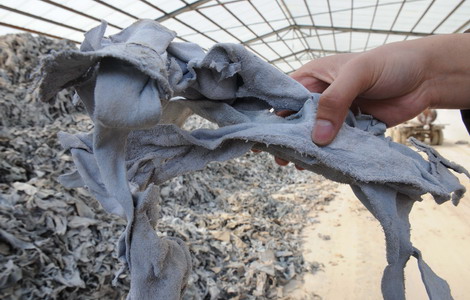 |
|
|
|
|||||||||||
|
 |
|
Huge piles of substandard leather scraps at the warehouse of Xueyang Gelatin and Glair Factory in Hengshui, Hebei province, were used to make gelatin that was sold to capsule makers. [Photo / Xinhua] |
Three pharmaceutical companies have recalled their chromium-contaminated drug capsules after authorities suspended sales of 13 types of problematic medicines.
Tonghua Yason Pharmaceuticals in Northeast China's Jilin province said the company decided to recall all tainted products made since 2010.
"Pharmaceutical producers do not possess the capability to examine capsules, so we just simply checked the quality report provided by capsule suppliers and then let them go," an anonymous official with the company's product quality department was quoted as saying by stcn.com, a website run by Securities Times.
But the company said the producer of the problematic capsules was a Zhejiang-based company and was not among those exposed by media.
China Central Television revealed in an investigative program on Sunday that nine pharmaceutical companies were packaging medicines with capsules made with industrial gelatin, which contains a much higher degree of chromium than edible gelatin.
The industrial gelatin was made from waste leather at plants in Jiangxi, Zhejiang and Hebei provinces, according to the report.
Normally, capsules are made with material from animal bones.
Excessive intake of chromium can result in chronic diseases.
Jilin-based Huinan Tianyu Pharmaceutical posted a statement on its website saying that it is recalling the batch of products exposed by CCTV, but "those products were not problematic because they were produced in 2009 and they accorded with the standards set in related code released in 2000".
The Chinese Pharmacopoeia, amended in 2010, permits no more than 2 milligram of chromium per 1 kilogram of medicine. Before that, the cap was 5 mg per 1 kg for heavy metal, but it had no specific stipulation about chromium, said the announcement.
The company's products were found with 3.54 mg of chromium per 1 kg of medicine.
Dandong Tongyuan Pharmaceutical in Northeast China's Liaoning province also announced the recall of its chromium-contaminated products, according to China News Service.
Xiuzheng Pharmaceutical Group in Jilin said in a statement on its website that the company has suspended sales of the problematic products but said "the capsule suppliers we pick are quality firms that meet all the country's standards and we are re-examining those products".
After the chromium scandal was exposed, websites for three pharmaceutical companies involved, including Xiuzheng, were hit by hackers.
Song Xunjie, a manager with Xueyang Gelatin and Glair Factory in Hebei province, was detained on Monday by police and suspected of setting fire to his factory to eliminate evidence.
The fire did not cause any casualties. The factory had suspended production and police sealed 200 tons of products there.
The factory mainly sold products in Beijing and Zhejiang, as well as cities such as Changzhou, Jiangsu province, and Xiamen, Fujian province, according to Xinhua News Agency.
Sun Zhongshi, an expert with the National Rational Drug Use Monitoring System under the Ministry of Health, said the drug watchdog paid more attention to the quality of medicine inside the capsules rather than the capsules themselves, and should draw a lesson from this scandal.
chenxin1@chinadaily.com.cn